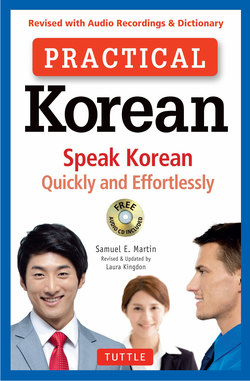Читать книгу Practical Korean - Samuel E. Martin - Страница 11
На сайте Литреса книга снята с продажи.
ОглавлениеLESSON 4
Names and Greetings
The sentences in this chapter are all very polite and are to be used with adult strangers.
Annyeong haseyo?
안녕하세요?
(Literally it means, are you well?)
How are you? / Hello.
Gomapseumnida.
고맙습니다.
Thank you.
Joesong hamnida.
죄송합니다.
My apologies, I’m sorry.
Mian hamnida.
미안합니다.
I’m sorry.
Sillye haesseumnida.
실례했습니다.
Excuse me (for something I did).
Sillye hamnida.
실례합니다.
Excuse me (for something I am doing).
Sillye hagesseumnida.
실례하겠습니다.
Excuse me (for something I am going to do).
Cheonman eyo.
천만에요.
(It’s one in 10 million words =) Not at all. Think nothing of it.
Gwaen chan seumnikka?
괜찮습니까?
Is it all right? May I?
or
Josseumnikka?
좋습니까?
Is it all right? May I? (more polite expression)
Gwaen chan seumnida.
괜찮습니다.
It makes no difference; it’s OK; you may.
Josseumnida.
좋습니다.
It’s all right; it’s good; it’s fine: you may.
Eoseo deureoosipsio.
어서 들어오십시요.
Come right in.
Tto boepgesseumnida.
또 뵙겠습니다.
See you later. So long.
Pyeonhage mani deuseyo.
편하게 많이 드세요.
Please help yourself.
Pyeonhage iseuseyo.
편하게 있으세요.
Please make yourself at home.
Annyeong(h)i gasipsio.
안녕히 가십시오.
Goodbye (to one who is leaving).
Annyeong(h)i gyesipsio.
안녕히 계십시오.
Goodbye (to one who is staying).
A Korean has two names: the family name is followed by a personal name. Most of the family names are of one syllable like Gim, Bak, Baek, Choe, Jang, Min, Yu, Im, but a few unusual ones have two syllables like Hwangbo. If the family name has one syllable, the personal name usually has two: I Seung man (Syngman Rhee). Gim Il(s)seong (Kim Ilsung). This system, together with most of the names themselves, was borrowed from China. Some names are exceptions to this system.
There is a trend toward more traditionally Korean names such as Areum 아름, Sora 소라 or Haneul 하늘. As English has grown in popularity in Korea in recent years, it’s also not uncommon to meet Korean children with English names written in Korean—for example, a child might be named 이삭 (isak, intended to be Isaac) or 제니 (Jenny).
There is a word for you (dangsin) but instead of using it the Koreans usually refer to a person either by title and name: Gim ssi = You (Mr., Mrs. or Miss Kim) or by title; for example, a teacher might be called seonsaengnim (선생님). This ending 님 (nim) is used toward people to whom you want to be extremely polite. 씨 (ssi) is also a polite term, but slightly less so than 님.
The word for I, me is na 나; for my nae 내. For he or she you say geusaram 그 사람 or geui 그의 = that person, for his or hers you say geu saram-ui 사람의 or just geu 그 = of that person. For they, them you can say either geusaram or geu saramdeul 그 사람들. For their geu saramdeul-ui 그 사람들의. Uri 우리 means we or our but sometimes it translates into English me or my.
You will notice that many common expressions have meanings which seem different from their literal translations. These literal translations are intended only as a help in remembering the words in the expressions.
